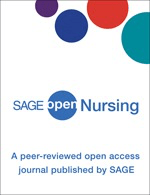
SAGE Open Nursing
Scope & Guideline
Connecting scholars and practitioners in nursing excellence.
Introduction
Aims and Scopes
- Nursing Education and Pedagogy:
Research focusing on instructional methods, curriculum development, and educational strategies to improve nursing education and student outcomes. - Healthcare Delivery and Management:
Studies exploring the organization, delivery, and management of healthcare services, including the roles of nurses in various healthcare settings. - Patient Care and Quality Improvement:
Investigations into patient care practices, quality of care, and interventions aimed at improving health outcomes in diverse populations. - Mental Health and Psychosocial Support:
Research addressing mental health issues among patients and healthcare providers, including the exploration of coping strategies and resilience. - Public Health and Community Nursing:
Studies that examine community health issues, public health interventions, and the role of nurses in promoting health and preventing disease. - Ethics and Professionalism in Nursing:
Exploratory studies focusing on ethical dilemmas, professional conduct, and the impact of nursing values on practice. - Technological Innovations in Nursing:
Research on the integration of technology in nursing practice, including telehealth, digital tools, and eHealth literacy.
Trending and Emerging
- Impact of COVID-19 on Nursing Practice:
A significant increase in research focusing on the experiences of nurses during the COVID-19 pandemic, including their mental health, coping strategies, and adaptations to new practices. - Telehealth and Digital Nursing Solutions:
Growing interest in studies examining the effectiveness and implementation of telehealth services, as well as the role of digital tools in enhancing patient care and education. - Interdisciplinary Collaboration in Healthcare:
Emerging research emphasizing the importance of interdisciplinary approaches in healthcare delivery, particularly in managing complex patient needs and improving outcomes. - Cultural Competence and Sensitivity in Nursing:
Increasing focus on cultural competence in nursing education and practice, addressing the need for nurses to provide care that respects diverse backgrounds and perspectives. - Self-Care and Wellness for Healthcare Professionals:
A trend towards exploring self-care practices and wellness initiatives aimed at improving the mental health and resilience of healthcare providers, particularly in high-stress environments. - Ethical Considerations in Nursing Practice:
Emerging discussions around ethical dilemmas faced by nurses, particularly in the context of resource allocation, patient autonomy, and end-of-life care.
Declining or Waning
- Traditional Clinical Skills Training:
There has been a noticeable shift away from solely traditional clinical skills training towards incorporating more simulation-based and technology-enhanced educational approaches. - Generalized Studies on Nursing Work Conditions:
Research that broadly addresses work conditions without specific context or focus is becoming less prevalent, as more studies concentrate on targeted interventions and specific populations. - Basic Nursing Knowledge Assessments:
There appears to be a waning interest in studies that primarily assess basic nursing knowledge, possibly due to a shift towards more complex and integrative approaches to nursing education. - Nursing Workforce Dynamics:
While still relevant, general studies on nursing workforce dynamics are being overshadowed by more focused research on specific issues such as burnout, resilience, and mental health among nurses.
Similar Journals

Nursing Practice Today
Bridging Research and Practice in NursingNursing Practice Today is an esteemed journal published by Tehran University of Medical Sciences, focusing on the dynamic and essential field of nursing. Since its transition to Open Access in 2015, this journal has facilitated wider dissemination of knowledge, allowing researchers, professionals, and students alike to engage with pioneering studies and practical advancements in nursing care. With an impact factor that reflects its relevance within the academic community, it holds a Q3 ranking in the nursing (miscellaneous) category as of 2023, and ranks 77th out of 139 in general nursing according to Scopus, placing it within the 44th percentile for its field. Nursing Practice Today publishes high-quality research, reviews, and case studies that aim to elevate nursing practices and improve patient outcomes across a variety of healthcare settings. As a platform that champions the ongoing education and professional development of nursing specialists, this journal plays a pivotal role in shaping contemporary nursing practice and addressing emerging challenges in healthcare.
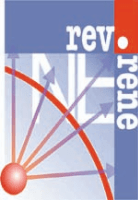
Rev Rene
Elevating Healthcare Discourse Through Collaborative ResearchRev Rene is a distinguished peer-reviewed journal dedicated to the dissemination of innovative research and advancements in the field of nursing and healthcare. Published by the Department of Nursing at the Federal University of Ceará, this journal has been an open-access platform since 2000, promoting the free exchange of knowledge and ideas among researchers, practitioners, and students worldwide. With an emphasis on accessibility, Rev Rene provides a vital resource in global health discourse, enabling practitioners and scholars alike to stay informed about the latest developments and evidence-based practices. The journal welcomes high-quality manuscripts that contribute to the nursing discipline, making it an essential venue for those looking to advance their work and engage with the global nursing community. By fostering an open exchange of ideas, Rev Rene plays a crucial role in shaping the future of nursing research and education in Brazil and beyond.
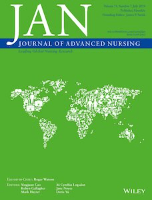
JOURNAL OF ADVANCED NURSING
Nurturing a legacy of excellence in nursing research.JOURNAL OF ADVANCED NURSING is a premier peer-reviewed journal published by Wiley, dedicated to advancing the field of nursing and contributing to the global dialogue surrounding nursing practices and education. With an impressive impact factor, this journal is positioned in the esteemed Q1 category for miscellaneous nursing journals in 2023, reflecting its rigorous standards and the high quality of published research. The journal covers a broad range of topics within nursing, promoting innovative research and critical discourse that informs best practices and policy decisions, making it an invaluable resource for researchers, practitioners, and students alike. With its foundational years dating back to 1976, the JOURNAL OF ADVANCED NURSING continues to uphold a legacy of excellence and impact, currently ranked #7 out of 139 in the Scopus General Nursing category, placing it in the top 95th percentile of nursing journals. Although primarily subscription-based, the journal provides access options that cater to institutions and emerging researchers, ensuring that vital knowledge is disseminated widely within the nursing community.
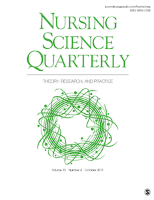
NURSING SCIENCE QUARTERLY
Empowering Professionals with High-Impact Research.NURSING SCIENCE QUARTERLY, published by SAGE PUBLICATIONS INC, is a premier journal in the field of nursing that has been contributing to the body of nursing knowledge since its inception in 1988. With an ISSN of 0894-3184 and an E-ISSN of 1552-7409, this journal plays a pivotal role in disseminating cutting-edge research and innovative practices that shape the healthcare landscape. Renowned for its robust editorial standards and a strong quality assurance framework, it is currently positioned in the Q2 quartile in the Nursing (Miscellaneous) category, reflecting its commitment to high-impact research. Although NURSING SCIENCE QUARTERLY does not offer open access, it remains accessible through various academic libraries and institutions, ensuring that researchers, professionals, and students can engage with the latest findings in nursing science. As it continues to evolve towards its convergence year of 2024, this journal is an essential resource for anyone looking to stay at the forefront of nursing research and practice.
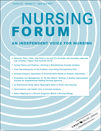
NURSING FORUM
Connecting Practitioners and Scholars in Nursing Advancement.NURSING FORUM, published by Wiley-Hindawi, is a premier journal dedicated to advancing the knowledge and practice of nursing across diverse contexts. With an ISSN of 0029-6473 and E-ISSN 1744-6198, this esteemed journal has been a vital source of scholarly communication since its inception in 1961, serving researchers, practitioners, and educators in the nursing field. Recognized for its impactful contributions, it holds a prestigious Q1 ranking in Nursing (miscellaneous) and ranks #18 out of 139 in Scopus' General Nursing category, placing it in the top 87th percentile of its field. With its publication continuity from 1961 to 2024, NURSING FORUM promotes innovative research, evidence-based practices, and critical discourse essential for the nursing profession. This journal not only provides access to cutting-edge studies but also fosters a collaborative platform for healthcare professionals and academics to engage and share insights. Whether you are a seasoned researcher or a nursing student, NURSING FORUM is your essential gateway to the latest advancements and discussions that shape the future of nursing.
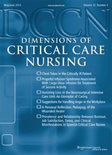
Dimensions of Critical Care Nursing
Exploring Innovations in Emergency Nursing PracticesDimensions of Critical Care Nursing, published by Lippincott Williams & Wilkins, is a premier journal dedicated to advancing the knowledge and practices within the fields of critical care and emergency nursing. With a distinguished history dating back to 1982, this journal plays a vital role in disseminating cutting-edge research, clinical advancements, and educational resources aimed at enhancing patient care in high-stakes environments. The journal is ranked in the Q2 quartile for both Critical Care Nursing and Emergency Nursing, reflecting its significant impact on the nursing field, with Scopus rankings placing it at #11 in Critical Care Nursing and #14 in Emergency Nursing. Targeting a multidisciplinary audience of researchers, clinicians, and students, the journal serves as a critical platform for discussions surrounding innovative patient care strategies, evidence-based practices, and emerging trends in critical nursing. Although it is not an open-access journal, it provides valuable insights that are essential for shaping the future of nursing practice. Stay informed on the latest research and contribute to the evolving landscape of critical and emergency care through Dimensions of Critical Care Nursing.

Revista Rol de Enfermeria
Catalyzing Change in Nursing Practices and PoliciesRevista Rol de Enfermeria, published by EDICIONES ROL S L, is a distinguished peer-reviewed journal that has been a cornerstone of nursing knowledge and practice since its inception in 1980. With a specific focus on the field of nursing and healthcare, this journal serves as a vital platform for researchers, clinicians, and educators to disseminate their findings, enhance professional practices, and support the development of evidence-based nursing care. Although its coverage in Scopus has been discontinued as of 2016, the journal has maintained an essential role in the nursing community, contributing to the advancement of general medicine as evidenced by its ranking in Scopus at #679 out of 862, placing it within the 21st percentile. While Revista Rol de Enfermeria does not currently offer an open access model, its historical significance and thematic relevance make it a valuable resource for professionals seeking to stay informed about the latest developments in nursing research and education. Situated in Barcelona, Spain, it continues to reflect the dynamic evolution of nursing practice across diverse healthcare landscapes.
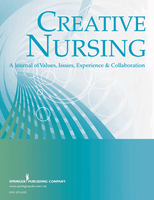
Creative Nursing
Navigating the Future of Nursing TogetherCreative Nursing, published by SAGE Publications Inc, is an esteemed journal dedicated to the fields of nursing and healthcare innovation. With the ISSN 1078-4535 and E-ISSN 1946-1895, this journal has been a vital resource for professionals and scholars alike since its inception in 1994. The journal operates under a non-open access model, ensuring rigorous peer-review standards while maintaining scholarly integrity. Ranked in the Q3 category for both Medicine and Nursing in 2023, Creative Nursing provides a platform for original research, innovative practice, and reflective discourse, aiming to enhance nursing education and improve patient care. As it converges from 1994 to 2024, it continues to explore critical themes that resonate with the evolving challenges in nursing and healthcare systems. With its current Scopus ranking of #85 out of 139 in General Nursing, it represents a significant contribution to nursing literature, appealing to researchers, professionals, and students committed to advancing nursing practice.
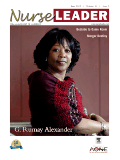
Nurse Leader
Shaping Tomorrow's Nurse Leaders TodayNurse Leader is a prestigious journal published by ELSEVIER SCIENCE INC, dedicated to the dynamic field of nursing leadership and management. With an ISSN of 1541-4612 and an E-ISSN of 1541-4620, this journal has been a vital resource since its inception in 2003, covering emerging topics and innovative practices that shape the future of healthcare leadership. As a Q3 category journal in the 2023 rankings, it holds a ranked position of #24 out of 40 in the Scopus Nursing Leadership and Management category, highlighting its significance in the academic community with a 41st percentile standing. Although not an open access journal, Nurse Leader provides valuable insights and research findings that equip researchers, professionals, and students with the knowledge and tools necessary for effective leadership in nursing. With a commitment to advancing the profession, the journal remains a crucial platform for sharing impactful research and fostering collaboration among practitioners in the United States and beyond.
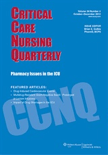
Critical Care Nursing Quarterly
Empowering Nurses with Cutting-Edge InsightsCritical Care Nursing Quarterly is a distinguished journal published by Lippincott Williams & Wilkins, catering to the vital field of critical care nursing. With an ISSN of 0887-9303 and an E-ISSN of 1550-5111, this journal has been contributing to the advancement of nursing practices since its inception in 1987. Over the years, it has gained recognition, earning a Q3 ranking in Critical Care Nursing for 2023 with a Scopus rank of #9 out of 27, placing it in the 68th percentile of its category. As a non-open access journal, it offers a curated selection of high-quality articles designed to disseminate critical findings, innovative practices, and essential reviews relating to nursing in critical care settings. The journal's ongoing commitment to improving patient care through research and education highlights its pivotal role in shaping the future of critical care nursing. For researchers, professionals, and students alike, Critical Care Nursing Quarterly serves as an indispensable resource in a field that impacts lives daily.